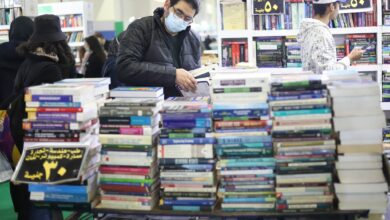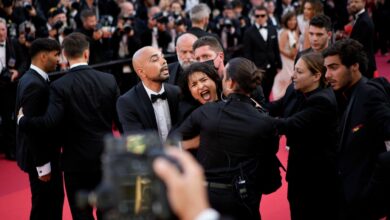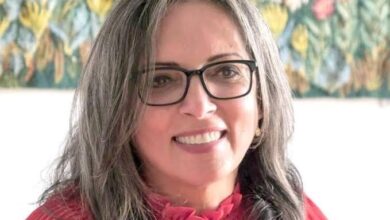Modern Egyptian feminism has taken many forms: religious and secular, public and private. One strand was born during the nationalist struggle of the early 1900s, when upper-class women like Safia Zaghloul and Huda Shaarawi left their homes to lead women’s protests against the British and found themselves unwilling to return to their previous quiet lives.
Shaarawi, born in 1879 to a wealthy family in Cairo, writes about her changing consciousness in the memoir “Harem Years,” published posthumously. Shaarawi tells of her public struggles—how she led protests against the British and founded the Egyptian Feminist Union—and her private ones. She opens the book with anecdotes about her bitter rivalry with her brother and her disappointments with the limits of female education.
The combination makes both for an interesting, readable memoir and a valuable contribution to late nineteenth and early twentieth century Egyptian history. The most revealing moments are where Shaarawi places herself in a naïve position and asks the most basic of questions. “I once asked Umm Kabira why everyone paid more attention to my brother than to me. 'Haven't you understood yet?' she asked gently.”
Women writers of the next generation were similarly inspired by their political activism, such as Latifa al-Zayyat, who wrote the pioneering “The Open Door.” Or, like Francophone poet Doria Shafik, they were inspired by Shaarawi.
But short story writer Alifa Rifaat, born in 1930, brought a different lens to Egyptian feminist writing. Her beautiful small stories, available in English translation in “Distant View of a Minaret,” have evoked mixed critical response. Some Western feminists have called Rifaat’s female characters passive, while in Egypt her books were controversial enough to be kept off shelves.
Rifaat was self-educated and firmly grounded in Islamic values, believing that women would be served best by a proper application of Islam. Her work doesn’t wave a flag of women’s rights—she was surprised to be called a feminist—but it does deal frankly with women’s desires, as in the collection’s title story.
The story opens with a discussion of the protagonist’s sexuality: “When they were first married she had tried to will her husband into sensing the desire that burned within her and so continuing the act longer; she had been too shy and conscious of the conventions to express such wishes openly. Later on, feeling herself sometimes to be on the brink of the experience some of her married women friends talked of in hushed terms, she had found the courage to be explicit about what she wanted…But on each occasion, when breathlessly imploring him to continue, he would—as though purposely to deprive her—quicken his movements and bring the act to an abrupt end.”
One of Rifaat’s strongest advocates has been the great Nigerian author Chinua Achebe, who teaches “Distant View of a Minaret” to his students. He once told interviewer Gayle Feldman, "Each little story [of Rifaat’s] looks little to begin with until you really reflect."
Author Nawal al-Saadawi was born in 1931, just one year after Rifaat. However, al-Saadawi’s feminism echoes that of Shaarawi, al-Zayyat, and Shafik, and her writing often seems in service of her political activism.
Al-Saadawi’s best-known book, internationally, is “Woman at Point Zero,” the story of a woman sentenced to death for killing her former pimp. But her most memorable works are the autobiographical ones: “Memoirs of a Woman Doctor,” “A Daughter of Isis,” and particularly “Memoirs from the Women’s Prison.” Deftly and even humorously told, this book follows al-Saadawi from a dreamlike description of her arrest into a very real-feeling prison.
As she writes at the beginning of Part II: Prison, "If the most difficult moment in the life of one sentenced to execution comes just before the guillotine falls on his neck, then the hardest moment I'd ever known came just before I entered the cell."
Salwa Bakr—although less controversial than the much-sued al-Saadawi—in many ways followed the older novelist’s path by writing stories in service of her feminist politics. Bakr, born in 1949, sets her first novel inside a women’s prison. “The Golden Chariot” is narrated by Aziza the Alexandrian, imprisoned for the murder of her stepfather. Aziza intends to liberate herself and a dozen other inmates from the ugly conditions by riding a “golden chariot” up to heaven.
“The Golden Chariot” treats its mostly working-class characters intimately and sympathetically. Although Aziza notes that the pickpocket Umm Ragab is a "wicked old woman," Aziza grows soft toward her when she recalls the older woman's tragic story. Not only did Umm Ragab’s daughter die in a fire, with the old woman unable to attend the funeral, but, "She needed an operation to change two valves in her heart which would, of course, never happen because there was no way Umm Ragab could afford the huge amount needed for a specialist operation of this kind; as for the government hospitals, the queues of those waiting for such operations overflowed into the street."
Aziza’s golden chariot never does ascend to heaven, suggesting that a solution to women’s problems must be found not in heavenly spheres, but on Earth, a rejection of a Rifaat-like spiritual approach to male oppression.
Among the nineties generation of Egyptian women writers, there are many who can be called feminist in the tradition of Shaarawi and al-Saadawi. There is also another, more accomodationist feminism to be found in books like Ghada Abdel Aal’s popular “I Want to Get Married!”
And there are others, like Miral al-Tahawy, who are taking yet another path. Al-Tahawy, born to a Bedouin family in 1968, does not call herself feminist, and does not see her fiction in service of an ideology. Al-Tahawy told the Washington Post in 2002: “I was never part of a feminist group…but just like my heroines, I have gone through hard times and this is what I call humanity. You will not find in my writing what is feminist, but what is human.”
Nonetheless, her novels—of which “The Tent” was her first, followed by “Blue Aubergine,” “Gazelle Tracks,” and “Brooklyn Heights”—are dominated by female characters searching for self-realization.
And gender issues are embedded into the English translation of “The Tent.” When al-Tahawy accepted her 2010 Naguib Mahfouz medal this past December, she spoke about how, as the novel was being translated into English, her brothers came forward to answer the male translator’s questions on her behalf. “I would stand behind the door and eavesdrop on my own stories that were being reinvented,” al-Tahawy said.
The post-25 January era will undoubtedly bring new structures and frameworks to women’s writing. The story of Egypt’s youngest authors—and whether they will draw on traditions that are feminist, religious, accomodationist, humanist, or something else—is only now being written.




